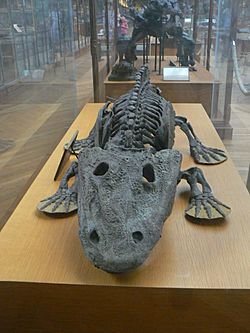Temnospondyl facts for kids
Quick facts for kids Temnospondyls |
|
|---|---|
 |
|
| Eryops, a large temnospondyl from the early Permian. National Museum of Natural History, Washington DC |
|
| Scientific classification | |
| Kingdom: | |
| Phylum: | |
| Superclass: | |
| (unranked): |
Batrachomorpha
|
| Order: |
Temnospondyli
|
Temnospondyls were a group of ancient animals. They were a type of tetrapod, which means they had four limbs. These creatures ranged from small to very large. They lived all over the world. Their time on Earth stretched from the Carboniferous period to the Triassic period. A few kinds even lived into the Lower Cretaceous.
Temnospondyls are often grouped with other early amphibians called Labyrinthodonts. These ancient amphibians were quite different from the frogs and salamanders we see today. Many temnospondyls from the early Permian period looked more like reptiles. This was because they had adapted to live in drier places. Even so, they were still amphibians, and scientists have found many fossils of their young, or larval, stages.
What Were Temnospondyls?
Temnospondyls were a very large group of animals. Scientists have found about 40 different families and 160 different genera of them. Their fossils have been discovered on every continent. Their history lasted for an amazing 210 million years! During this long time, they adapted to many different habitats. They lived in fresh water, on land, and even in coastal marine areas.
Life on Land and Water
Scientists have found fossils of temnospondyls at all stages of life. This includes their larval stage, when they changed (called metamorphosis), and when they were fully grown. Most temnospondyls lived partly in water and partly on land. They were called semiaquatic. Some were almost completely land animals. They would only go back to the water to lay their eggs.
These temnospondyls were some of the first animals with backbones that could live fully on land. Even though temnospondyls are considered amphibians, many had special features. These included scales, claws, and bony plates that looked like armor. Modern amphibians do not have these features.
The youngest known temnospondyl is the Australian Koolasuchus. This creature lived about 120 million years ago. This was during the Early Cretaceous period.
Images for kids
-
Prionosuchus, from the Permian, the largest batrachomorph ever found.
-
Siderops, a Jurassic temnospondyl.
See also
 In Spanish: Temnospóndilos para niños
In Spanish: Temnospóndilos para niños
 | Frances Mary Albrier |
 | Whitney Young |
 | Muhammad Ali |









